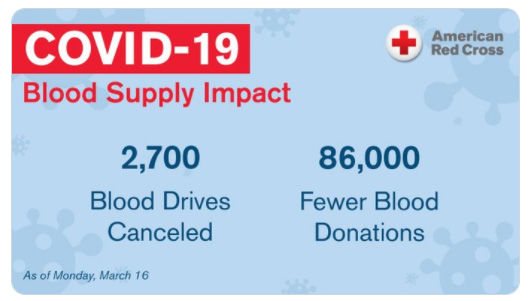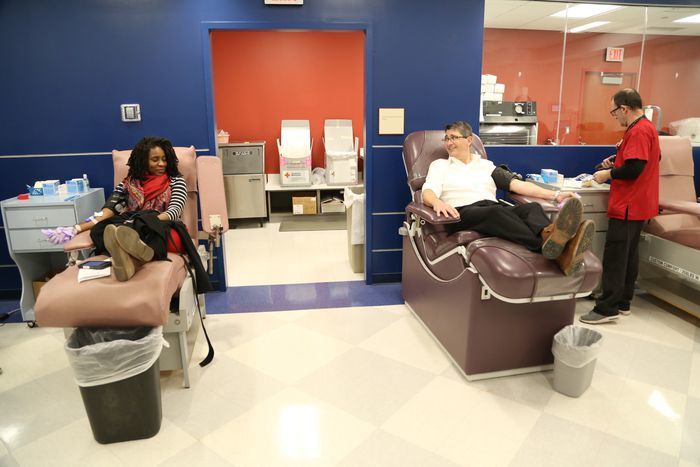Doctor Q&A: What Should You Know About the COVID-19 Blood Shortage?
Published: April 6, 2020; Page Last Updated: September 17, 2020
As the number of coronavirus infections surge past 1.3 million global cases, front-line medical care providers continue to scramble for critical resources needed to help patients struggling with COVID-19.
In addition to shortages of ventilators, personal protective equipment and beds, we are now learning that the Red Cross, which supplies 40% of blood in the United States, is facing a severe blood shortage.

Patients are asking important questions about the availability of blood. Those questions include:
- What is causing the blood shortage during the coronavirus pandemic?
- What is the potential impact of the COVID-19 blood shortage?
- Does blood expire? Are there best practice guidelines for using donated blood?
- Can people still donate blood? If so, how?
To answer these questions, I contacted Dr. Eric Roselli, the Chief of Adult Cardiac Surgery at the Cleveland Clinic. Dr. Roselli has performed successful heart surgery on many patients in our community including Denise Kirchner, Mark Ridder and John Ruland. So you know, Dr. Roselli regularly donates blood.
Here are the highlights of my video interview with Dr. Roselli.
Key Learnings from Dr. Roselli's Interview
During our interview, Dr. Roselli provided important learnings specific to blood shortages during the coronavirus outbreak:
- Blood is a critical resource for treating patients with serious conditions including heart disease, cancer, anemia, liver failure, infections, burns and trauma.
- Daily use of blood and blood products at hospitals include 36,000 units of blood, 7,000 units of platelets and 10,000 units of plasma.
- Strategies to prevent the spread of coronavirus, including social distancing, have inhibited the ability of the Red Cross to host blood drives. Since the coronavirus pandemic began, there have been 2,700 blood drive cancellations resulting in 86,000 fewer blood donations.
- Dr. Roselli continues to donate blood during the COVID-19 crisis.

Dr. Roselli Giving Blood at the Red Cross
- Only 10% of eligible people donate blood. There are select eligibility criteria for donors (e.g. 16 years of age or older, weigh at least 110 pounds).
- Blood has a shelf-life. Forty-two days is the maximum shelf-life of blood. Research indicates that blood fresher than 30 days is best.
- Donating blood is quick and safe. From check-in to check-out, the process takes about 30 minutes. All donors have a mini-physical prior to donation. Donors sit in chairs that have been wiped clean with sanitizer. The chairs have at least 6 feet of space between them.
- Dr. Roselli recommends using the "Rapid Pass" online tool to accelerate the registration process for Red Cross donations.
How Can You Donate Blood?
As Dr. Roselli shared in the video, "I know everybody is trying their best. Donating blood is another way to give back."
Here are several links that can help you learn about donating blood and scheduling an appointment.
- Free eBook: Advances in COVID-19 & Heart Valve Therapy
- Coronavirus and blood donation safety protocols
- Eligibility requirements to donate blood
- Schedule an appointment to donate blood
- Start the "Rapid Pass" to donate blood
Thanks Dr. Roselli!
Many thanks to Dr. Roselli for helping our community learn about the COVID-19 blood shortage and the ways we can donate blood during the coronavirus outbreak to support patients in need.
As always, many thanks to Dr. Roselli and the entire Cleveland Clinic team for taking care of patients in our community
Keep on tickin!
Adam
P.S. For the hearing impaired members of our community, I have provided a written transcript of Dr. Roselli's interview below.
Video Transcript
Adam: Hi everybody, it’s Adam with HeartValveSurgery.com, and we’re having another COVID update. As we’ve all seen, this is a beyond challenging time for the entire world including our community of heart valve patients, and I was just having a very interesting conversation with Dr. Eric Roselli from the Cleveland Clinic. Dr. Roselli, are you there?
Dr. Roselli: Hi Adam!
Adam: Thanks so much for being with us today live from Cleveland. So the folks in our community know, Dr. Roselli is the chief of adult cardiac surgery. He’s also been a tremendous source of education, hope, and incredible surgical outcomes for patients in our community that have included people like Denise Kirchner, Mark Ritter, and just recently, Dr. Roselli performed surgery on John Ruland, who had, I believe, Dr. Roselli, an aortic valve replacement and aortic aneurism surgery. Is that correct?
Dr. Roselli: That’s right. I saw him today. He looks great.
Adam: Dr. Roselli, we were just talking all about a constraint in cardiac surgery, a constraint all over medicine today, which is blood. Before we get to that, I wanted to just ask you a question about you. Obviously, you’re a tremendous person with a huge role there at the Cleveland Clinic. Could you maybe share a little bit about your passion for cardiac surgery and what your specialties are there in Cleveland?
Dr. Roselli: As you and I were just talking about, in light of a pandemic, which has taken all of our attention, other diseases don’t take a break. We can stay home. Our businesses can go on breaks. Our jobs can be on furlough situations. Cardiovascular, cardio-aortic, valve diseases continue. My passion is about treating those problems because I’ve always wanted to make sure that when I come to work every day, I’m motivated to take care of serious problems, and I consider it a blessing to be able to take care of people with life-threatening problems and make a difference in their lives. That’s still true 5,000 operations later.
Adam: In this pandemic, we are now seeing constraints all over the place. You watch any news channel, pick up any feed out there, you’re going to hear about shortages of personal protective equipment, the masks, the gowns. You’re going to hear about shortages just in terms of capacity in beds, and we’ve also learned all about shortages for ventilators, which are needed for those folks who have very critical situations related to COVID-19. Can you talk about something that maybe hasn’t gotten as much publicity here, which is all about the shortages in blood?
Dr. Roselli: When we’re talking about COVID-19 and ventilators and all these other important resources, like intensive care unit beds, we’re talking about serious problems. As I mentioned, there’s a lot of other serious diseases that people are affected by, not only heart disease, cancer, trauma. In the modern world, the way that we save lives from those problems requires a lot of resources, and one of the most important resources to take care of really sick patients is blood. Something like 36,000 units of blood are used daily. It’s really one of those things we take for granted until we’re in a situation where we have to think twice about it like so many other things. Platelets, 7,000 units of platelets, 10,000 units of plasma. It happens every day. The reason it happens is because people do wonderful things, and they donate that blood on a regular basis.
The reason there’s a shortage now is not because COVID-19 is requiring more blood. It’s because of the impact of social distancing, and what’s happening in our society is making it harder for people to donate blood. We still need it. We still have a lot of sick people who need it, but the ability for people to go to their church or their school or go to a blood drive at their workplace in the lunchroom or whatever, which used to be a common way for the Red Cross to gather blood is now a little bit limited. There are blood drives still happening, and if you go online, you can find them, or you can go to your local blood donation center and do so. It is really safe. I’ve been there personally. Personally, I give blood on a regular basis. It’s one of the ways that I give back. As the way I volunteer in my community, I give my blood back, but I’ve gone to the Red Cross center instead of my local community center. I’ve seen it first-hand. They’re very safe. You get your temperature checked on your way in. There’s hand sanitizer everywhere. Spacing is undertaken, and all the safety measures that are necessary are in place to make sure that if someone wishes to give back to the community in that way, they can do so safely and not be worried about it.
Adam: To give some additional context about the number of drives that have been canceled, I was just reading, Dr. Roselli, I think it’s now up over 2700 drives that have been canceled, and 80% of the blood that teams like yours are using comes from those drives. I know a lot of patients are asking themselves what can I do to help? What can I do? They don’t have to be patients. It can be anybody watching this. What can I do to help in this situation? Obviously, giving blood is one thing that they can do. You talked a little bit about the procedure. Can you talk about how long it takes to give blood? Is it you just sit down and it’s a period of time? How does that all work?
Dr. Roselli: It’s actually really cool. If you go – the website is great. You go to the Red Cross. If you do the rapid pass online, it actually shortens your visit. The registration process and the questionnaire where they check about your medical history, safety, and all that is expedited with that process. You can be in and out of there in less than a half an hour. The time that you’re plugged into an IV to drain the blood into the bag is about 10 minutes or so. It’s a pretty quick and easy process. The interesting thing is at least a third, maybe 40% of patients are actually eligible to donate blood. You can’t if you’re a child. You can’t if you’re young. You can’t if you’re really small. You’ve got to weigh more than 110 pounds. There’s some other details about your travel history. They’ve even eased up on some of the regulations. For example, they ask questions about sexual history. It used to be a year-long weight for certain kinds of exposures. Now they’ve reduced it to three months, but the process is pretty straightforward, and they’ve eased the ability to do it. All the blood is tested so it’s safe.
Although the fact that about 30 to 40% of people are eligible, what we’ve seen historically is only 10% of those eligible people actually donate blood, so it’s something that people should do more. One of the things that’s important to understand is blood has a shelf life. 42 days is the max. It’s actually been shown that the blood is even better if it’s fresher than 30 days. It is important that throughout this whole unpredictable phase we’re going through that we continue to think about this, and it will continue to be important going forward no matter what.
Adam: I cannot thank you enough for bringing up this very important topic for our community at this very difficult and challenging time. I want to thank you for all the great things that you’re doing there in Cleveland, all the great people that you’ve helped from our community in the past, all those that you’re going to help in the future. What we’re going to do now, we just want to make sure that we can give people an opportunity to donate blood. You mentioned there’s a website. I’m seeing here you can call 1-800-REDCROSS. Again, that’s 1-800-REDCROSS. You can also go to redcrossblood.org, and there is also an app available to all the people out there, and that app is up on the App Store. Dr. Roselli, again, thank you for everything that you and your team are doing for not just the patients there in Cleveland but our entire world. This is just a very difficult time, and without your support, without your skills, it would be more difficult. Thank you so much and look forward to talking with you in the future.
Dr. Roselli: My pleasure, Adam. Always great to talk with you, and back at you with the gratitude, man. Thanks for getting the message out there to people to give them the courage to do what they need to do to treat their own heart disease and valve disease problems. Thank you for spreading knowledge about things like what we can do to help our own community members, and again, especially now, when the surgeries we are still doing are emergencies, we probably do need blood even more often in those situations. Please, folks, do what you can to help out. I know everybody is trying their best. This is just another way to give back.
Adam: Perfectly said. Thank you so much, Dr. Roselli. Take care.
Dr. Roselli: You too.




